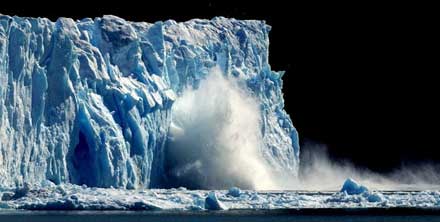
The case for nuclear energy is not solely linked
to global warming

by Andrew Teller
Nobody denies global warming nowadays, but some
scientists do question its causation by man-made carbon dioxide
(CO2) emissions. In a nutshell, their analysis goes
like this1:
-
The two most important greenhouse gases
are by far water vapour and CO2. The former is
at least 27 times more abundant than the latter and has an
infrared absorption
power eight times as high, which explains why the responsibility
for greenhouse effect rests overwhelmingly with water vapour.
A detailed calculation shows that the share of responsibility
is 99.4% for water vapour and 0.45% only for CO2.
-
The atmosphere content of CO2 is controlled by
two “sinks”,
vegetation (terrestrial and marine) and the oceans, which contain
50 – 60 times more CO2 than air. When
the average temperature of the earth increases, the solubility
of CO2 in seawater
decreases and a slight degassing of the oceans takes
place, thereby increasing
the CO2 content of the atmosphere. The increase
in the CO2 content of the atmosphere would,
therefore, be a
consequence
of global
warming and not its cause, as is widely held.
-
Anthropogenic emissions of carbon dioxide represent less than
1% of the carbon dioxide content of the atmosphere. Consequently,
the contribution of anthropogenic emissions amounts to less
than 1% of 0.45%, i.e. 45 parts per million which is completely negligible.
To a layman such as me, the above views do not
seem to contain obvious shortcomings. They are, however, in sharp
opposition with those of the International Panel on Climate Change
(IPCC), the UN-appointed body investigating the matter. My purpose
is not to use this column to spark an argument which, as has
been seen in the past, can easily turn sour. Let me just point
out that the resolution of this difference is in principle very
simple: either the sceptics’ analysis is beside the point
or it isn’t. In the first case, this is worth demonstrating
by those upholding the official position; the IPCC theory can
only gain from being seen as capable of overcoming objections
based on scientific reasoning. In the second case, the said objections
should be taken into account as a matter of urgency, given the
magnitude of the measures envisaged to combat a climatic evolution
over which we would actually have no control whatsoever.

I would rather reflect on the consequences for
nuclear energy of the possible conclusion that, after all, human
activities play no meaningful part in global warming. Would such
a conclusion deprive nuclear energy, as a CO2-free
source, of its raison d’être? The answer is clearly no, because
global warming is but one piece of the puzzle humankind must
solve. It is worth recalling the other elements from time to
time, lest we lose track of an important part of the big picture.
So let’s review the other main reasons why nuclear must
be a part of the solution, all climatic concerns set aside.
Diversification: this conceptcovers
two equally important aspects of security of supply.
-
Fuel procurement: the different sources
of energy we can consider are available in different
quantities in different
parts of the world. Uranium
contributes to the diversification of many countries’ energy
sources and therefore enhances
security of supply.
-
Avoidance of production
bottlenecks: recent events have made it painfully clear that
production capacities cannot
be rapidly
adjusted to growing needs without causing disruption
somewhere in the economy. This has been the case with the
diversion of
corn crops to the production of biofuels that triggered
a sharp price increase at the beginning of 2008. The spectacular
increase
of the cost of petrol is likewise ascribable to
some extent to a lack of refining capacity. Sharing the burden
of building
the
needed generation capacity between different technologies
can only reduce the threat of production bottlenecks.
Concentration: this feature is all too often overlooked. Nuclear
fuel is a highly concentrated source of energy: a few lorries are
enough to keep a nuclear reactor running for a whole year. A coal-fired
unit of the same power would require many more lorries every day
in order to fulfil its purpose. This might not seem very important
to many, but not to those who are aware of motorways crowded by
uninterrupted queues of lorries, e.g. in the Beijing area, or of
saturated railway networks striving to keep coal-fired power stations
in operation. The high concentration of nuclear fuel is admittedly
the cause of the high toxicity of its waste, but this is no reason
for ignoring its positive aspect: every cloud is entitled to its
silver lining.
Additional resource: being relieved of the need
to limit CO2 emissions does not relieve mankind from
the duty to evolve to a more sustainable way of life. The predictable
decrease
in fossil reserves has finally started to sink in the collective
awareness. Most renewable energy sources are ill-suited to base
load power generation. Humankind will need decades to adjust to
the new conditions through an assortment of technical innovations
and societal measures. Renewing an automobile fleet takes around
fifteen years in a healthy economy. Replacing the existing housing
stock by new builds meeting the current isolation criteria can
take a century. Over such time scales, nuclear energy can help
to smooth out the transition and provide a much needed breathing
space, all the more so that fuel recycling opens the prospect of
vastly increased reserves.
Competitiveness: it is difficult to provide reliable
figures at a time when raw materials and fuels undergo rapid changes.
Our best bet is however that their prices will keep increasing
and (perhaps) stabilise at levels previously unheard of. In terms
of consumption of steel and concrete per MWh, nuclear power plants
are rather well positioned: not as well as gas-fired units, roughly
equivalent to coal-fired plants and much better than wind turbines.
There are therefore good reasons to expect competitive prices for
nuclear power plants, as witnessed by the renewed interest of a
growing number of utilities everywhere in the world.
Pointing out the contribution of nuclear energy to the fight against
global warming is justified given the state-of-the-art knowledge
regarding climate change. Doing it too narrowly would not only
be a strategic mistake, it would first and foremost ignore the
very basic fact that no energy source can provide a universal answer
to humankind’s future needs nor be excluded at no cost from
the portfolio of available options.
1 If you want to know more about the views of those
who question the role of anthropogenic CO2 emissions, www.globalwarmingheartland.org is
one of many starting points available.
|

